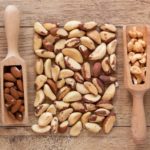
Carly Hanna
BSc (Human Nutrition and Psychology)
Interest in vegetarian and vegan diets has grown over the recent years and studies have shown several health benefits.
With that said, we also must be aware of certain drawbacks following a vegetarian and vegan diet long-term. So far, the research suggests that certain deficiencies are possible if the diet is not carefully planned out and monitored.
These deficiency include
- vitamin B12
- vitamin D
- calcium
- iron
- choline
- omega 3-fatty acids.
Today, we’ll look at things to be aware of if you are planning to reduce your meat and animal foods intake.
What is a “Vegan diet”?
A vegan diet excludes all animal products and is based solely on plant-based foods such as
- fruits
- vegetables
- wholegrains
- nuts/seeds
- beans/legumes
- dairy and egg-free alternatives
It can also exclude other animal by-products such as honey and gelatine.

Veganism today is more than just a diet. This includes avoiding animal derived substances such as leather, wool, fur, and animal skin.
Veganism is a lifestyle
The main drivers behind a vegan diet are to improve health, animal welfare and ethics, and to reduce our environmental footprint.
RELATED — The Vegan Diet and Lifestyle: Benefits, Risks and Meal Plan
What is a “Vegetarian diet”?
A vegetarian diet typically excludes meat, poultry and seafood.[1]
While animal byproducts ensure that none of the animal goes to waste, some may be avoided due to religious or cultural beliefs, whether vegetarian or vegan. This can include
- gelatin (commonly found in lollies and jellies)
- rennet (found in some cheeses)
- casein (a protein found in milk that can be used for cheese, protein powder supplements, craft materials and toothpaste)
- carmine (red food coloring from red beetles)
- animal fat (found in pastries, crayons and other food and non-food items)[2]
Compared to a vegan diet, vegetarians can include dairy and eggs.
Different types of vegetarians include
- pescetarian
- ovo-vegetarian
- lacto-vegetarian
- flexitarian
The main focus of the diet is on plant-based foods.
Vegans and vegetarians around the world
The popularity of vegan diets has increased significantly over the past 10-20 years, especially in countries like the US, UK, Australia, and New Zealand.[3]
Approximately 40% of vegetarians or vegans decided on this lifestyle change for the welfare of animals, while 25% point out environmental concerns and 25% say that their own health is the main reason for changing dietary habits.[4,5]
The remaining 10% include religion, poverty, eating disorders and disliking meat and/or animal products as the main reasons for being vegan or vegetarian.[6]
RELATED — Understanding Eating Disorders – History, Types and Statistics
As of 2019, 10% of New Zealanders identify as vegetarian (3% up from 2018).[6,7]
In terms of global statistics, the country that has the most vegetarians is India, mostly due to religious and cultural reasons. Other countries that follow are Mexico, Brazil, Taiwan and Switzerland.
The country where veganism is most popular is the United Kingdom. Other countries that follow include Australia, Israel, Austria and New Zealand.
Research behind Vegan and Vegetarian Diet
The data that we looked into focused on groups enjoying a vegetarian and/or vegan diet for a short to moderate term (up to 24 months), and then comparing them to a Western diet.
A Western diet refers to the Standard American Diet
This type of diet is high in processed foods, sugar, refined grains, vegetable oils and meat.
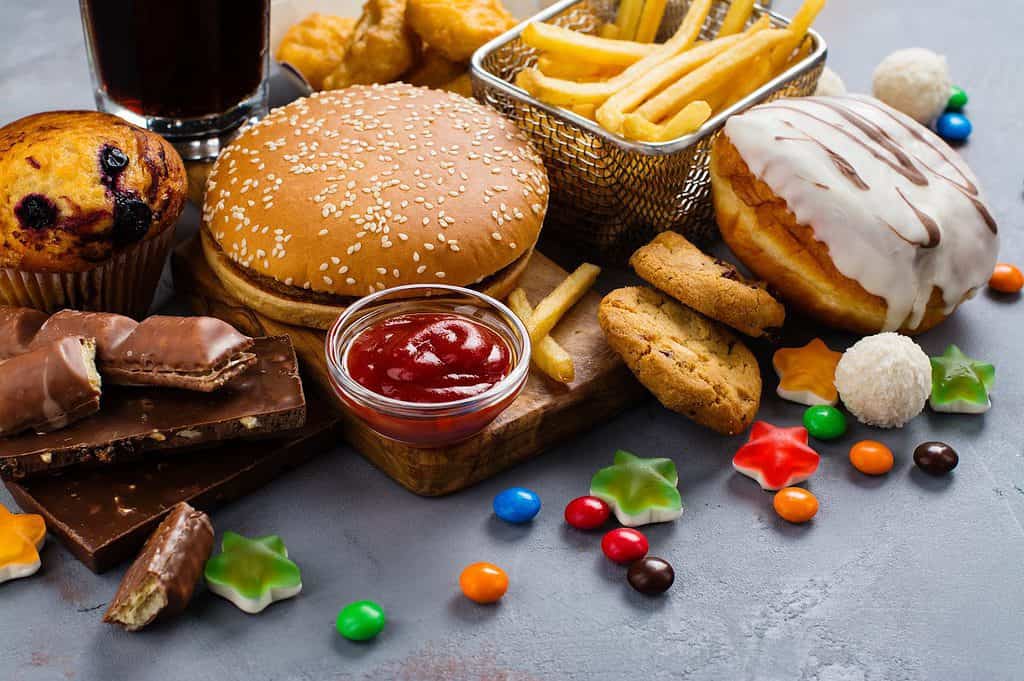
It is important to note that this research is for strict vegetarians and vegans, not flexitarians (occasionally eating meat) or pescetarians (avoiding red and white meat, but eating fish and seafood).
RELATED — Flexitarian Diet: Eat like your life depends on it
With the elimination of dairy and eggs, as well as meat, vegan diets are generally higher in
- fibre
- folate
- vitamin C
- vitamin E
- magnesium
RELATED — Magnesium (for a great night of sleep)
However, it’s important to understand that, when compared to a Western diet, vegan diets are also more likely to be deficient in
- saturated fats
- omega 3’s
- vitamin D
- vitamin B12
- calcium
- zinc[8]
Overall, vegetarian and/or vegan diets have shown to have a reduced risk of
- obesity (BMI of 23 compared to 25 in meat eaters)[9]
- some types of cancers (14-45% reduced risk of colon, lung and prostate cancer, and 8% reduced overall cancer risk)[10]
- type II diabetes (50% reduced risk)[11]
- cardiovascular disease (10-30% reduced risk)
- stroke (21% reduced risk)[12]
when compared to the Western diet.
RELATED — Diabetes: Early Signs, Causes, Types and Treatment
It is important to note that this evidence is based on individuals with a well-planned vegetarian and/or vegan diet focusing on wholefoods and small amounts of processed foods including plant-based meats.
RELATED — Alternative to meat: Unprocessed plant-based protein sources
While this shows us the benefits of a vegetarian and vegan diet in the short term, what we are looking into today is if the benefits outweigh the risks when vegan and vegetarian diets are followed long-term (more than 24 months).
Long-term Vegan and Vegetarian Diet Health Risks
For literature on strict vegetarians and vegans, the amount of research for long term health risks is not as extensive compared to the short to moderate term health risks.
However, it is known that with certain vitamins and minerals it can be harder to meet daily requirements when not consuming animal products.
The following health conditions and nutrient deficiencies are more common on vegetarian and vegan diets.
Vegan diet and low energy
As vegan foods are often high in fiber and lower in calories, it is common not to get enough energy from plant-based foods. Over time, this could lead to a decrease in energy levels.
Ongoing low energy is often diagnosed as chronic fatigue syndrome.
A person on a Western diet consumes 2,500-3,600 calories a day, whereas the average vegan consumes around 2,000 calories a day.[13]
Plant-based food tends to be higher in fiber and lower in fats, compared to meat, dairy and egg products. This means that vegans feel fuller and are consuming less calories overall.

While the recommended caloric intake varies widely across individuals, and varies on activity levels as well as genetics, the average calorie consumption is around 2,500 for men and 2,000 for women.
Another reason for having low energy levels on a vegan diet is due to not consuming enough iron, which we cover later in the article.
Vegetables and intestinal permeability (leaky gut syndrome)
Antinutrients, such as tannin, lectin and phytates, are compounds found in plants that can reduce the body’s ability to absorb certain nutrients.
These compounds are commonly found in legumes and grains, which are a staple of a healthy vegan diet.
Some plant-based foods can cause irritation in the gut, especially if there are already symptoms of a leaky gut (indigestion, flatulence, nausea and abdominal pain, low energy). These foods can include
- nightshade vegetables (tomatoes, capsicum/peppers, eggplant, white potatoes)
- high sugar fruit (bananas, mangoes, oranges, cherries, kiwifruit, grapes, pears, peaches)
- gluten (breads and pastas)
- nuts (almonds, cashews, etc)
- processed foods (such as plant-based meats and cheeses)[14]
Fermenting, soaking and sprouting these foods can help reduce the antinutrients and help prevent a leaky gut.[15]
Soy protein and hormone disruption
There is a common myth that increased soy consumption can disrupt hormones and lead to increased risk of diseases such as breast cancer.
However, there is little scientific evidence behind these claims and the results are inconclusive.[16]
There is also some evidence suggesting that soy protein isolate can reduce testosterone levels in men, however, other studies have shown that there is no significant association.[17,18]
Vegan diet and vitamin B12 deficiency
Vitamin B12 is produced by bacteria, not plants or animals and is found in high quantities in animal products.[19]
Vegans are more at risk of vitamin B12 deficiency
Vitamin B12 is important for the function of red blood cells, DNA, and the brain and nervous system. Symptoms of a vitamin B12 deficiency include
- mouth ulcers
- nerve problems (pins and needles)
- disturbed vision (blurriness)
- mood problems (anxiety and depression)
Vegan sources of Vitamin B12 include fortified non-dairy milk, yeast products, including marmite and nutritional yeast.[16,20]
Vegan diet and zinc deficiency
Zinc is commonly found in meat and seafood such as oysters, crab, beef and pork. It is important for growth and the immune system.
RELATED — Zinc (for immunity, skin health and libido)
Zinc is also important for cell development, building proteins and the functioning of the immune system. Symptoms of zinc deficiency include
- brittle nails
- slow wound healing
- hair loss
- eye problems
- diarrhea
- mood changes
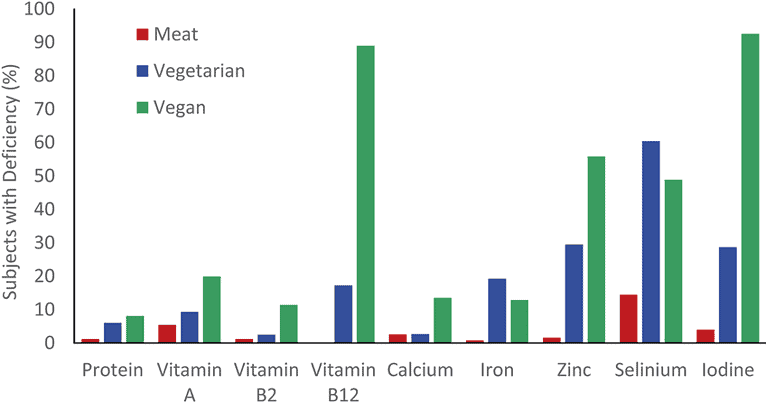
Source: McKune, S. Sustainable livestock systems to improve human health, nutrition, and economic status. (2019)
If you are enjoying a vegan diet than you should look to consume more zinc plant based-sources such beans, legumes, tofu, wholegrains, nuts and seeds.[21]
Plant-based diet and iron deficiency
Iron is important for the development and maintenance of red blood cells, which carry oxygen throughout the body. An iron deficiency can cause symptoms such as
- low energy
- poor circulation (cold hands and feet)
- hair loss
- pale skin
Animal products contain haem iron, which is more absorbable than plant-based sources of non-haem iron.[22] However, vegans and vegetarians can still reach their iron requirements through plant-based proteins.
Vegan sources of iron include
- beans and legumes
- spinach
- wholegrains (oats, wholemeal breads and pastas, quinoa)
- nuts (cashews, almonds, peanuts)
and combining these with vitamin C rich foods (such as tomatoes, broccoli and oranges) can increase the iron absorption.
RELATED — Vitamin C: Immunity and Collagen booster
Vegan foods and calcium deficiency
Since dairy products are high in calcium, and vegans do not consume dairy, there is a possibility of becoming calcium deficient if other sources of calcium are not introduced into the diet.
Signs of a calcium deficiency can include
- muscles aches, cramps and spasms
- numbness and tingling in extremities
- fatigue and irritability
- confusion and memory loss (severe deficiency)
Plant-based sources of calcium include
- non-dairy milks (fortified soy milk, almond milk, oat milk)
- some dairy-free cheeses
- soy products (tofu and tempeh)
- sesame seeds (including tahini)
- dark green leafy vegetables
It is important to note that not all dairy-free cheeses and dairy-free yogurts are fortified with calcium.
Plant-based diet and vitamin D deficiency
Vitamin D deficiency is becoming rather common and is more of a reflection of our lifestyle than our diets.
While certain amounts can be obtained through food, most of our vitamin D should come from the sun and spending time outdoors.
Vegans are more likely to have a lower vitamin D intake
This is because vitamin D is more present in animal-based foods.[16,20]
Signs of a vitamin D deficiency include
- fatigue
- sleep problems (insomnia)
- muscle aches
- depression
- hair loss
- loss of appetite
- low immune function (prone to infections)
Some non-dairy milks are fortified with vitamin D which are a great option for vegans. Mushrooms also contain a small amount of vitamin D.
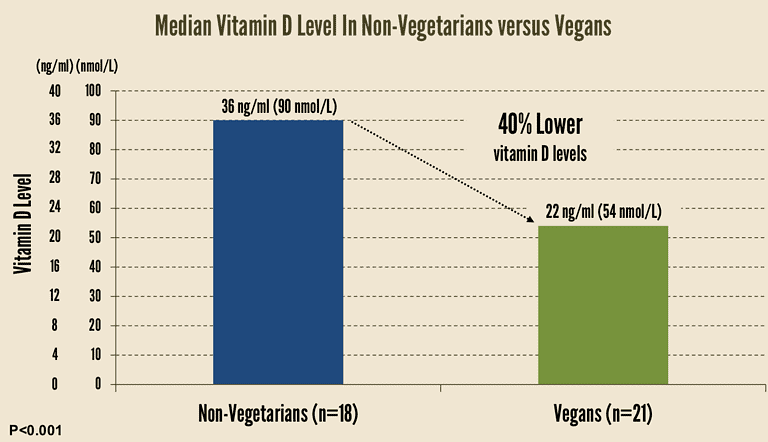
For the general population as well, it is recommended to take a supplement when sun exposure is limited.
RELATED — Vitamin D: The sunshine hormone for stronger bones
Omega 3 fatty acids level and plant-based foods
Omega-3 is an essential fatty acid that is primarily needed for brain health and cognitive function as well as cardiovascular health.
Other functions of omega 3 fatty acids include skin, hair, and nail health. As omega-3 are commonly found in seafood, vegetarians and vegans are more likely to be low in omega 3’s.
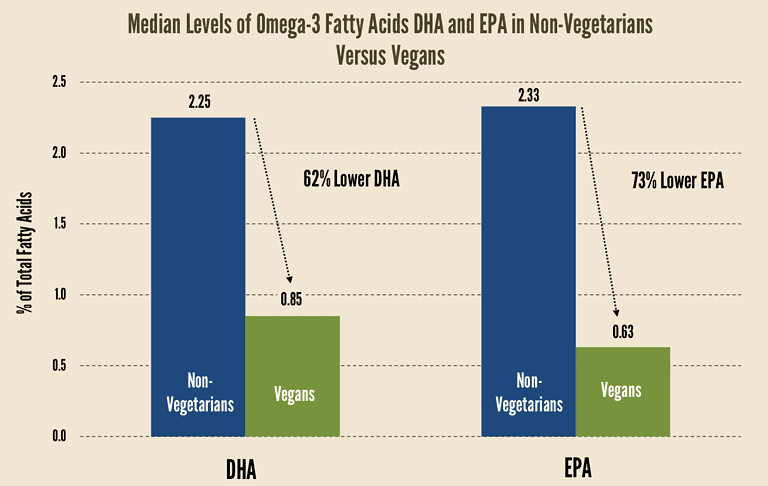
Signs of an omega-3 deficiency include
- fatigue
- poor memory
- dry skin
- heart palpitations
- mood changes (depression)
- poor circulation
In order to avoid this, plant-based sources containing omega 3’s include flaxseeds, canola oil and walnuts.[1]
Increase in Omega 6 fatty acids
Omega-6’s are found abundantly in several plant foods including nuts, seeds and whole grains.
Because a vegan diet is based on these foods, it is common to have an even higher intake of omega 6’s.
The current ratio of omega 6’s to omega 3’s in the Western diet is 15:1, whereas the ratio in vegetarian and vegan diets are thought to be similar, if not slightly lower.
The optimal ratio of omega 6’s to omega 3’s is between 3:1 and 1:1[23] Overall, everyone’s fatty acid intake could be improved.
Problems that are associated with having a higher omega-6 to omega-3 ratio are having a higher risk of
- inflammation in the body
- cardiovascular disease
- some types of cancers
- autoimmune diseases[24]
Hemp seeds have the best omega 6 and omega 3 ratio of approximately 3:2, which is optimal for health.
Related Questions
1. Do vegans have a weaker immune system?
The current evidence is mixed, suggesting that the immune system can be enhanced or suppressed on a vegan diet, depending on the quality of food eaten.
It is important to know that there is a difference between plant-based whole foods and processed plant-based foods.
2. What diseases are vegans more prone to?
The most common health risks that vegans are more exposed to are vitamin and mineral deficiencies.
Other health conditions listed previously are assessed more on an individual basis.
3. Are my chances of developing hypothyroidism higher on vegan or vegetarian diets?
Vegetarians and vegans are at higher risk of hypothyroidism, compared to the omnivore diet, if they do not consume enough iodine rich foods.[25]
Have you been enjoying a vegan or a vegetarian diet for a while now? If so, let us know in the comments below how you are getting along, and if you have any personal advice to share?
Having passion for mental health and nutrition, Carly’s goal is to become a registered psychologist with a focus on self-care – food, exercise, and sleep. She has a special interest in various mental health disorders, plant-based diets, and the relationship between food and mood.
Through evidence-based research, holistic approach to health and personal experience, Carly hopes to empower others’ well-being.
Carly is a part of the Content Team that brings you the latest research at D’Connect.
References
1) Tuso P, Stoll SR, Li WW. A plant-based diet, atherogenesis, and coronary artery disease prevention. The Permanente Journal. 2015;19(1):62. Retrieved from https://www.ncbi.nlm.nih.gov/pmc/articles/PMC4315380/
2) Joseph Rauch. What are animal products and byproducts? Public Goods. 7 Aug 2019. Retrieved online. Available from: https://blog.publicgoods.com/what-are-animal-products-and-byproducts/
3) Sentient Media. Increase in Veganism: Is Veganism Growing in 2022? How Fast Is It Growing? Hemi Kim. May 13 2022. Retrieved online. Available from: https://sentientmedia.org/increase-in-veganism/
4) Kantar Better Futures Report 2022. Retrieved online. Available for download from: https://www.kantarnewzealand.com/latest-thinking/better-futures/
5) The Vegan Society. Worldwide Growth of Veganism. 2022. Retrieved online. Available from: https://www.vegansociety.com/news/media/statistics/worldwide
6) Health Navigator NZ. Vegetarianism and Veganism. Nov 17 2022. Retrieved online. Available from: https://www.healthnavigator.org.nz/healthy-living/v/vegetarianism-veganism/
7) Quora. Which countries are vegetarian friendly? 2022. Retrieved online. Available from: https://www.quora.com/Which-countries-are-vegetarian-friendly
8) Winston J Craig, Health effects of vegan diets, The American Journal of Clinical Nutrition, Volume 89, Issue 5, May 2009, Pages 1627S–1633S. Retrieved from https://doi.org/10.3945/ajcn.2009.26736N
9) Cade, J., Burley, V., & Greenwood, D. (2004). The UK Women’s Cohort Study: Comparison of vegetarians, fish-eaters and meat-eaters. Public Health Nutrition, 7(7), 871-878. Retrieved from doi:10.1079/PHN2004620
10) Le LT, Sabaté J. Beyond meatless, the health effects of vegan diets: findings from the Adventist cohorts. Nutrients. 2014 May 27;6(6):2131-47. Retrieved from doi: 10.3390/nu6062131. PMID: 24871675; PMCID: PMC4073139.
11) Melina V, Craig W, Levin S. Position of the Academy of Nutrition and Dietetics: Vegetarian Diets. J Acad Nutr Diet. 2016 Dec;116(12):1970-1980. Retrieved from doi: 10.1016/j.jand.2016.09.025. PMID: 27886704.
12) Campbell T. A plant-based diet and stroke. J Geriatr Cardiol. 2017 May;14(5):321-326. Retrieved from doi: 10.11909/j.issn.1671-5411.2017.05.010. PMID: 28630610; PMCID: PMC5466937.
13) Ahmed Zayed. 90% Of US Has a Poor Diet, and 25% Don’t Exercise, Study Finds. Bens Natural Health. May 17 2022. Accessed online. Retrieved from https://www.bensnaturalhealth.com/blog/general-health/average-american-diet-and-exercise/
14) Healme. Leaky Gut Diet – Foods to Eat, Foods to Avoid. 23 Feb 2021. Retrieved online. Available from: https://heal.me/articles/leaky-gut-diet
15) Healthline. How to Reduce Antinutrients in Food. 2017. Retrieved from https://www.healthline.com/nutrition/how-to-reduce-antinutrients#TOC_TITLE_HDR_5
16) Key TJ, Appleby PN, Rosell MS. Health effects of vegetarian and vegan diets. Proceedings of the Nutrition Society. 2006 Feb;65(1):35-41. Retrieved from doi:10.1079/PNS2005481
17) Barbara L. Dillingham, Brianne L. McVeigh, Johanna W. Lampe, Alison M. Duncan, Soy Protein Isolates of Varying Isoflavone Content Exert Minor Effects on Serum Reproductive Hormones in Healthy Young Men, The Journal of Nutrition, Volume 135, Issue 3, March 2005, Pages 584–591, https://doi.org/10.1093/jn/135.3.584
18) Hamilton-Reeves JM, Vazquez G, Duval SJ, Phipps WR, Kurzer MS, Messina MJ. Clinical studies show no effects of soy protein or isoflavones on reproductive hormones in men: results of a meta-analysis. Fertility and sterility. 2010 Aug 1;94(3):997-1007. https://doi.org/10.1016/j.fertnstert.2009.04.038
19) McManus, K. D. (2021). What is a plant-based diet and why should you try it. Harvard Health Blog. Retrieved online, available from https://www.health.harvard.edu/blog/what-is-a-plant-based-diet-and-why-should-you-try-it-2018092614760
20) Clarys P, Deliens T, Huybrechts I, Deriemaeker P, Vanaelst B, De Keyzer W, Hebbelinck M, Mullie P. Comparison of nutritional quality of the vegan, vegetarian, semi-vegetarian, pesco-vegetarian and omnivorous diet. Nutrients. 2014 Mar;6(3):1318-32. Retrieved from https://www.mdpi.com/2072-6643/6/3/1318
21) Murphy EW, Willis BW, Watt BK. Provisional tables on the zinc content of foods. Journal of the American Dietetic Association. 1975 Apr 1;66(4):345-55. Retrieved from https://europepmc.org/article/med/1090644’
22) Anderson GJ, Frazer DM, McKie AT, Vulpe CD, Smith A. Mechanisms of haem and non-haem iron absorption: lessons from inherited disorders of iron metabolism. Biometals. 2005 Aug 1;18(4):339-48. Retrieved from https://link.springer.com/content/pdf/10.1007/s10534-005-3708-8.pdf
23) Simopoulos AP. Evolutionary aspects of diet, the omega-6/omega-3 ratio and genetic variation: nutritional implications for chronic diseases. Biomed Pharmacother. 2006 Nov;60(9):502-7. doi: 10.1016/j.biopha.2006.07.080. Epub 2006 Aug 28. PMID: 17045449.
24) Simopoulos AP. The importance of the ratio of omega-6/omega-3 essential fatty acids. Biomedicine & pharmacotherapy. 2002 Oct 1;56(8):365-79. DOI: 10.1016/s0753-3322(02)00253-6
25) Lightowler HJ, Davies G, Trevan M. Iodine in the diet: Perspectives for vegans. Journal of the Royal Society of Health. 1996;116(1):14-20. doi:10.1177/146642409611600104




